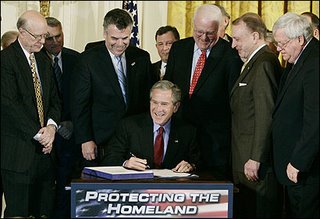
Without fail, Bush’s justification for declaring himself exempt has been his constitutional authority as interpreted by the president and his legal counsel. Incredibly, he has exempted himself from over 750 bills enacted as law by his own signature.
As citizens, we also have constitutional rights. We are all entitled to the protections under those rights and the liberties guaranteed by them. It is only logical then, that when Congress passes a law that imposes upon our rights and/or liberties that we must have the same prerogative to exempt ourselves from the oppressive nature of that law.
I am proposing the use of “Citizen Signing Statements” to be issued by individual citizens to interpret your personal understanding of a law and how, or even if, that law applies to you.
Below is an example of a Citizen Signing Statement based on a statement issued by President Bush for one of the many laws he intends to ignore. Please, feel free to copy and modify the statement to apply to any law you feel particularly adamant about and from which you would like to be exempt.
Constitutionality Signing Statement
I, ____(name)____, as a citizen of the United States of America and a licensed driver in the state of Connecticut, shall construe as advisory the provisions of the Connecticut Seat Belt Law that purport to direct or burden the conduct of an adult operator of a motor vehicle with the mandatory usage of seat belts even when no other passengers are in the vehicle, which purport to direct drivers to conform to legislation originated and promoted by the insurance industry and intended to achieve specific policy objectives which would monetarily benefit said industry by reducing the number of traffic accident related injuries, but containing no provision for the reduction of policy premiums to the consumers.
Such provisions, if construed as mandatory rather than advisory, would impermissibly interfere with citizens' constitutional liberties under the fourth amendment to be secure against unreasonable searches and seizures as well as the eighth amendment banning cruel and unusual punishment as would surely be the case of any penalty imposed for the victimless crime of failure to use a seat belt.


1 comment:
You have an outstanding good and well structured site. I enjoyed browsing through it teeth whitening Meridia available for purchase online air purifier review Riverpoint golf club houston 59 jeep wipe motor Usb mini adaptor to 2.5 headset dell cpx battery Software company kansas city patio furniture Asthma cause its
Post a Comment